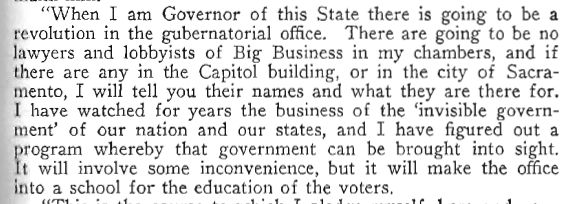EPIC
“End Poverty In California” (EPIC) was the motto of Upton Sinclair’s 1934 campaign for Governor of California. Sinclair is far better known as a radical writer than political candidate and the Jersey Guy he was (before he moved to California).
Sinclair wrote a wonderful book about that campaign – I, Governor of California – And How I Ended Poverty – that told the story of how the media attacked him and the Democrats sabotaged him. For a current piece on the implications of that dirty campaign, see: The Traumatic Birth of the Modern Vicious Campaign.
(and if you ever want a good read on the press, who controls it, and how it operates, read Sinclair’s book “The Brass Check” – read it on line!)
For the “revolutionary” tone of Sinclair’s campaign, here’s an excerpt from his book – don’t you love this pledge: “There are going to be no lawyers and lobbyists for Big Business in my chambers”:
There are echoes of that campaign now, particularly how the Democrats derailed the Sanders campaign and the corporate media and Democrats have attacked the Jill Stein Green Party. Let’s hope the results are not similar (Google and find out how it turned out).
Here is the EPIC Platform:
- A legislative enactment for the establishment of State land colonies, whereby the unemployed may become self-sustaining and cease to be a burden upon the taxpayers. A public body, the California Authority for Land (the CAL) will take the idle land, and land sold for taxes and at foreclosure sales, and erect dormitories, kitchens, cafeterias, and social rooms, and cultivate the land using modern machinery under the guidance of experts.
- A public body entitled the California Authority for Production (the CAP) will be authorized to acquire factories and production plants whereby the unemployed may produce the basic necessities required for themselves and for the land colonies, and to operate these factories and house and feed and care for the workers. CAL and CAP will maintain a distribution system for the exchange of each other’s products. The industries will include laundries, bakeries, canneries, clothing and shoe factories, cement-plants, brick-yards, lumber yards, thus constituting a complete industrial system and a new and self-sustaining world for those our present system cannot employ.
- A public body entitled the California Authority for Money (the CAM) will handle the financing of CAL and CAP. This body will issue scrip to be paid to the workers and used in the exchanging of products within the system. It will also issue bonds to cover the purchase of land and factories, the erection of buildings and the purchase of machinery.
- An act of the legislature repealing the present sales tax, and substituting a tax on stock transfers at the rate of 4 cents per share.
- An act of the legislature providing for a State income tax, beginning with incomes of $5000 and steeply graduated until incomes of $50,000 would pay 30% tax.
- An increase in the State inheritance tax, steeply graduated and applying to all property in the State regardless of where the owner may reside. The law would take 50% of sums above $50,000 bequeathed to any individual and 50% of sums above $250,000 bequeathed by any individual.
- A law increasing the taxes on privately owned public utility corporations and banks.
- A constitutional amendment revising the tax code of the State, providing that cities and counties shall exempt from taxation all homes occupied by the owners and ranches cultivated by the owners, wherever the assessed value of such homes and ranches is less than $3000. Upon properties assessed at more than $5000 there will be a tax increase of one-half of one per cent for each $5000 of additional assessed valuation.
- A constitutional amendment providing for a State land tax upon unimproved building land and agricultural land which is not under cultivation. The first $1000 of assessed valuation to be exempt, and the tax to be graduated according to the value of land held by the individual. Provision to be made for a state building loan fund for those who wish to erect homes.
- A law providing for the payment of a pension of $50 per month to every needy person over sixty years of age who has lived in the State of California three years prior to the date of the coming into effect of the law.
- A law providing for the payment of $50 per month to all persons who are blind, or who by medical examination are proved to be physically unable to earn a living; these persons also having been residents of the State for three years.
- A pension of $50 per month to all widowed women who have dependent children; if the children are more than two in number, the pension to be increased by $25 per month for each additional child. These also to have been residents three years in the State.

